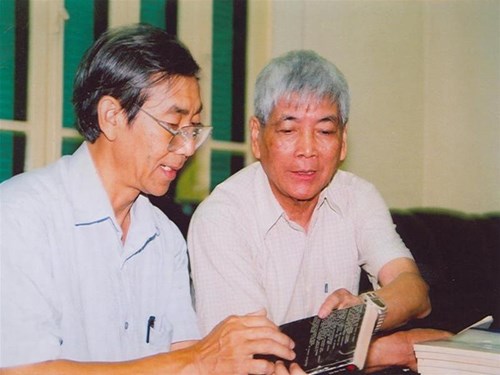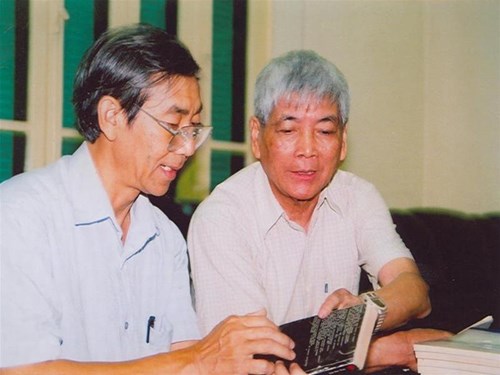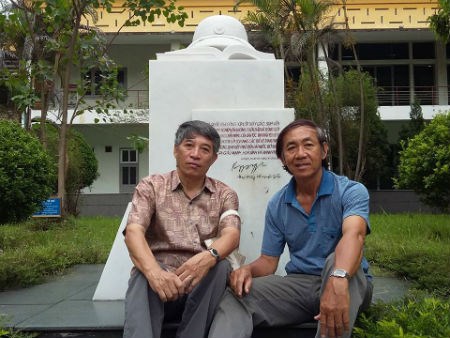
That's the story of a son in times of turmoil.
In 1954, Pham Thanh Hung was born and raised in Nga Son, Thanh Hoa province. This land, known for its "Nga Son mats and Bat Trang bricks," is a picturesque region with historical relics and stories of talented Vietnamese people. However, in Hung's childhood memories, he only saw a region of mat weaving, marked by the hardships and struggles of its people.
Answering the call of the Fatherland, in 1971, Pham Thanh Hung, a K15 student of the Faculty of Literature at Hanoi University, "put aside his studies and went to fight" right during the most brutal phase of the resistance war against the US to save the country.
Before leaving, he returned home to tell his mother that he would be enlisting in the army. He thought his mother would be very upset, and he waited to see her cry. But he waited and waited and she didn't cry, and she said to him, "That's what happens to a son in times of war."
Even now, whenever he talks to students, he still jokes about that time: "So, my mother sold me to the country!" Because, more than anyone else, his mother understood that in war, bombs and sacrifice were inevitable; everyone had to go to war for their country, for their homeland. And also because she was a strong mother, like so many women at that time.
When he set off, he was not yet old enough to enlist, only 17 years old. The send-off ceremony on September 6th of that year will also remain in his memory.Bidding farewell to his university and hometown, Pham Thanh Hung, along with 400 other students from Hanoi University, set off to join the army.
At that time, the Quang Tri battlefield was extremely fierce. Some people were killed before they even had a chance to meet or get to know each other's names. Even now, the memory that remains vivid for my teacher is the story of April 23, 1972, when his artillery company suffered a defeat, with one-third of its men killed. During the battle, a comrade lay in my arms, severely wounded all over his body, with no means to apply a tourniquet to stop the bleeding. He could only cry out: "Mother! Hung! You must save me…" The blood of his comrade flowed on my arms, while my tears flowed. I could do nothing, only helplessly watch my comrade grow cold and die. So many young men fell on the Quang Tri battlefield at the prime of their lives. A decade ago, my teacher returned to the old battlefield and found the grave of his comrade from that time. As he recounts this, his eyes become distant and blurred with tears.

Associate Professor Pham Thanh Hung (on the left) and poet Viet Phuong
The "beggar of the past"
Like countless other soldiers, Mr. Pham Thanh Hung once had moments of "weakness" on the battlefield, overwhelmed by homesickness, missing his parents and even his university. Those were days spent amidst bombs and bullets. Then, one day, the battlefield became eerily silent, not a single bomb blast, not a sound, not a groan, only the mournful cooing of doves in the mountains. At that moment, young soldier Pham Thanh Hung felt as if he had fallen into a void, shuddering as he thought: "War is perhaps the destiny of our nation; I don't know when it will end, and will our nation have to live with this war forever?" That was the only time he felt pessimistic and discouraged in the midst of battle.
After numerous near-death experiences and injuries, and days of fighting during bombing raids where all he could see was the thick black smoke of artillery shells, rendering him immobile and believing he was going to die, the suffering of the battlefield naturally spurred the young soldier Pham Thanh Hung on: “I had a very subjective thought: I cannot die, and we young students will not die; we will return. We will return to dispel the sadness on the faces of the principal and our loved ones on the day we said goodbye before leaving.”
Of the 400 students from Hanoi University who left their studies to fight in the war, only about fifty returned. The rest fell, their remains scattered across the battlefields of Quang Tri. Every year, on July 27th, April 30th, and August 28th (the teacher's birthday, and also the founding day of the 308th Division under the 1st Corps, the first main infantry division of the Vietnam People's Army established in 1949), the teacher remembers his comrades most. Almost every year, he goes to Quang Tri, visits the National Cemetery on Highway 9, and lights incense for his comrades and friends from his company who rest peacefully in their scattered graves.
The teacher shared: “Returning from the cemetery, I felt more at peace, more in love with life, and considered myself fortunate and happy. I am also proud to have fought alongside the martyrs lying silently beneath those tombstones. They sacrificed themselves like heroes, like innocent, pure, and noble young men; they fell without needing anyone to acknowledge their merits. I remind myself not to “dwell on the past,” to try to erase the haunting memories of war, to strive towards the future, but clearly, the wartime past has become a kind of asset, a kind of “savings.” Whenever I feel sad, I take it out to savor, to comfort myself: in my youth, I did something meaningful in life. Savoring these memories, I become more generous, more forgiving of others and of myself.”

Assoc. Prof. Dr. Pham Quang Long and Assoc. Prof. Dr. Pham Thanh Hung
Moving forward after the pain of war.
Leaving a part of his youth behind on the fierce battlefield, he returned to complete his university program, studying intensely to compensate for the years spent in combat, and then continued to teach at the university. In 1985, he went to Czechoslovakia as a postgraduate student. In 1991, he returned to Vietnam and was assigned a series of important tasks at Hanoi National University, such as: Head of the Journal and Publishing Department of Hanoi University, Editorial Secretary of the Hanoi University Newsletter, Vice Dean of the Journalism Faculty - Hanoi University, Editor-in-Chief - Deputy Director of Hanoi National University Publishing House, Associate Professor, PhD, lecturer in the Faculty of Literature, Hanoi University of Social Sciences and Humanities…
In addition to teaching, he has also written many valuable books such as:The Czech Republic - Country and People; Travel philosopher Tran Duc Thao; Journalism and media terminology. The reciprocal influence between journalism and literature…
More than 40 years have passed since he enlisted, and the wounds, which he optimistically and poetically described to his mother in a letter all those years ago as "small and pretty, like a woman's watch, Mom," have now become scars that have endured through the years. His right eardrum was ruptured due to the pressure of artillery fire. Now, whenever he speaks, he always tries to listen with his remaining ear. He smiles gently and says, "Anyone who doesn't know might think I'm impolite, that I always turn my face away when talking."
Despite the lasting effects of war, the teacher continued to fight tirelessly on the intellectual front, hour after hour, day after day.
Having passed the age of 60, this former student soldier on the battlefield continues his mission of "nurturing future generations" in the lecture halls, serving as a teacher to countless students across the country. "You students now, with your sharp hearing and good health, and without the wars of our time, should take advantage of this opportunity to learn foreign languages, to open the door to a new world, to enter a new era, to absorb and master knowledge, science and technology, and social sciences, and to contribute to the country," – this is the sincere advice from a former teacher to today's students.
According to Dantri and Nhandan
Author:Le Nhung
Newer news
Older news